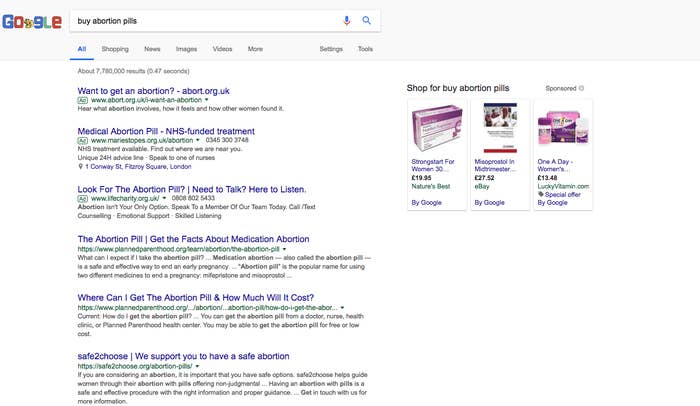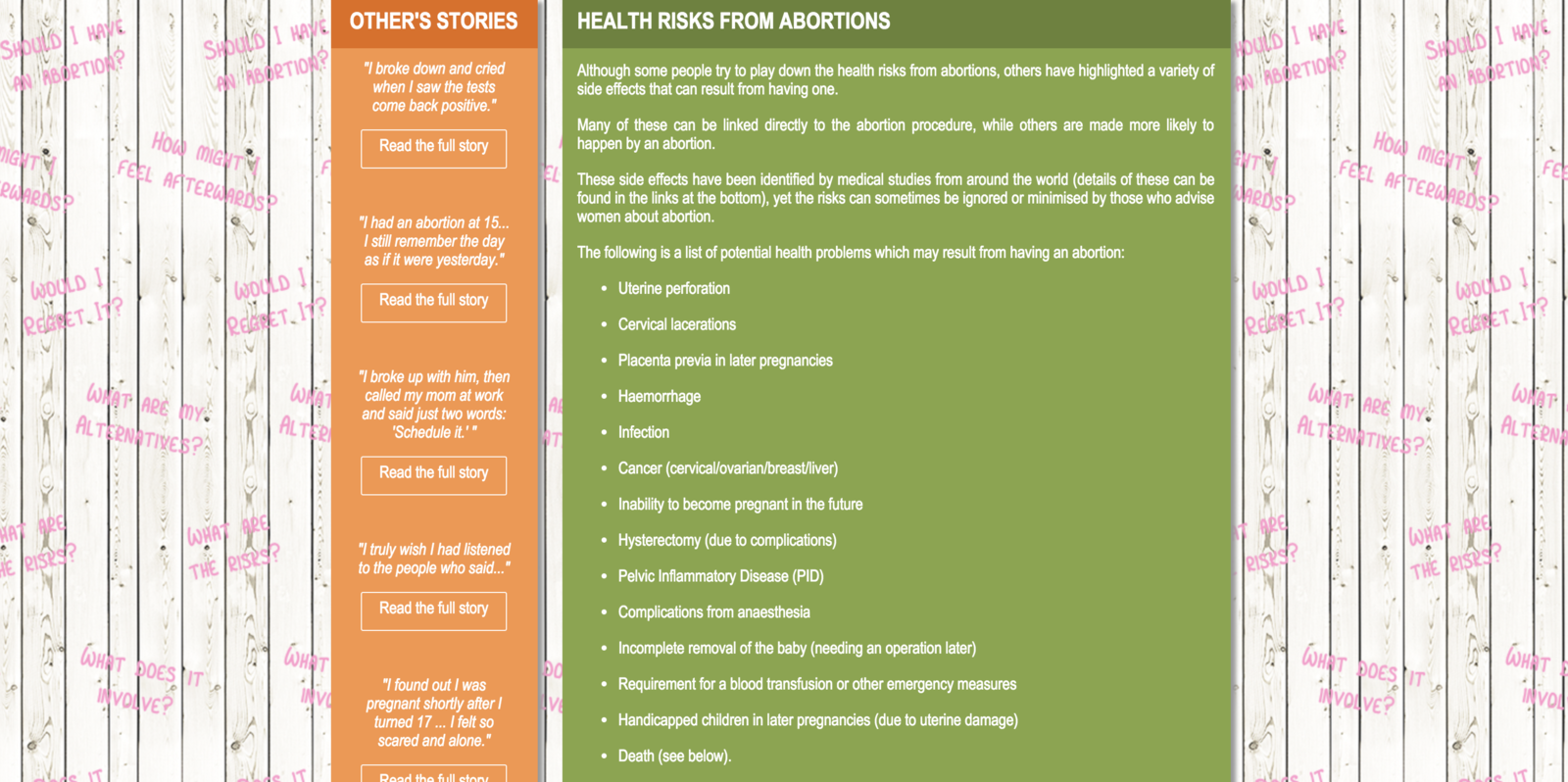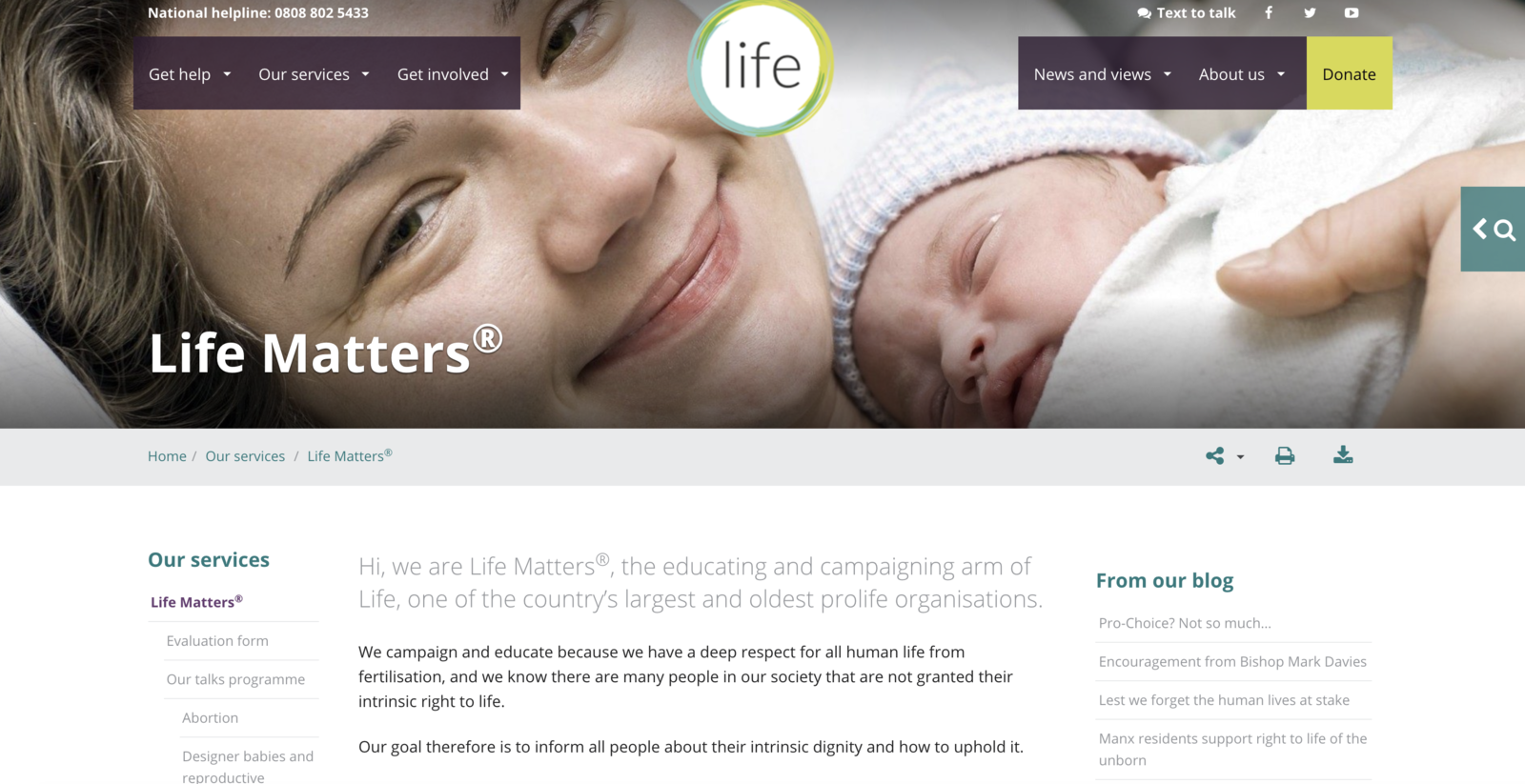
Anti-abortion groups that have incorrectly linked abortion to breast cancer, infertility, depression, and drug abuse have paid to appear in the top results for common Google searches seeking abortion services.
A search for "buy abortion pills online" conducted by BuzzFeed News this week produced sponsored links for religious anti-abortion group Abort.org and Life, an anti-abortion group that offers accommodation to women facing crisis pregnancies. Marie Stopes – one of the UK's leading abortion providers – also appeared in the top three results.
Google says the wording of the links that appear in the search results, and the information contained on the landing pages they lead to, means that the anti-abortion groups are not in breach of any of their policies.
Non-sponsored links for international sexual health group Planned Parenthood; another of the UK's leading abortion service providers, BPAS; and Women on Web, which provides abortion pills to women in countries where abortion is illegal, appear further down in the results for "buy abortion pills online".
While it is illegal to access the drugs for medical abortion outside of licensed settings, the number of women in the UK seeking to buy them online has increased steadily in recent years.

BuzzFeed News analysis found sponsored links for Life also appeared in the top three results for the following searches: "abortion pills", "I need an abortion now", "I need an abortion asap", and "abortion pills price". In 2017, Life received £250,000 of government funding from the "tampon tax", after it was confirmed that funds raised by the 5% levy on sanitary products would be used to support women's charities.
Sponsored and unsponsored links to BPAS and Marie Stopes also regularly appeared in the top three results for those searches. An unsponsored link for NHS abortion guidelines appeared as the third result for “I need an abortion now” – but ranked lower on the other searches.
One sponsored search result for Abort.org that reads "want to get an abortion?" leads to a page offering to "tell you more about what an abortion actually involves, and to share others' experiences with you".
The page offers links to stories from women, all of whom either regretted their abortion or chose not to go through with it and encouraged those reading to do the same, and a "help page" that states abortion could lead to depression, anxiety, low self-esteem, flashbacks, and eating disorders.
The search result for Life reading "Look for the abortion pill" leads to a page with contact links to its counsellors, who offer "a safe place for you to explore your situation and talk through your feelings – free and in complete confidence".

On a page describing its services, Life states an outright opposition to abortion. "Our goal therefore is to inform all people about their intrinsic dignity and how to uphold it," the page reads. In educational materials designed to be distributed in schools, Life also claims that an abortion could lead to a decline in mental health.
A variety of peer-reviewed research has disputed any link between abortion and worsened mental health, according to the Royal College of Gynaecologists and Obstetricians and NHS guidance.
Elsewhere on its website, Abort.org lists infertility, cancer, and death as risks of abortion, and in 2011 Life published material that claimed abortion can lead to breast cancer. NHS guidance states that risks of infertility following abortion are small, and only likely if the procedure results in an infection that is left untreated. NHS guidance also disputes any link between abortion and cancer.
Both Life and Abort.org say they offer women facing unwanted pregnancies impartial advice, and say abortion providers such as Marie Stopes and BPAS will only ever encourage a woman to have an abortion. They also claim that abortion providers fail to support women who may be pressured into a termination by a coercive partner.
A disclaimer on Abort.org, however, states that information on its site "does not constitute medical advice, and is not a substitute for medical consultation or treatment".
"We would always recommend that you consult a qualified health professional straight away for advice on your individual health needs, and would never endorse delaying such a consultation for any length of time," the disclaimer adds.
Marie Stopes and BPAS told BuzzFeed News that Care Quality Commission regulation requires them to offer pre-procedure counselling, from registered practitioners, which explores options including abortion, adoption, fostering, and continuing with the pregnancy, and that around 1 in 20 women who book appointments for abortion do not go ahead with it.
Both organisations say they also work to identify when women are experiencing domestic violence and signpost them to the relevant support services.
“Informed choice is at the heart of our charity’s mission, and every woman we serve is talked through her options before booking an appointment and once again at the clinic," a spokesperson for Marie Stopes told BuzzFeed News.
Marie Stopes was last year accused of incentivising staff to encourage women to go ahead with abortions after a CQC report suggested staff's pay was linked to performance targets. Marie Stopes said that targets were linked to encouraging women to have IUDs – considered to be one of the most effective forms of contraception – fitted following abortion procedures.
A Marie Stopes spokesperson added that options discussed with women "include whether to continue with the pregnancy and raise the child, continue with the pregnancy and opt for adoption or fostering, or to end the pregnancy with an abortion".
"In 2017, around 1 in 22 of our clients did not proceed with a procedure after booking an appointment, either because she changed her mind or because we weren’t assured that she was certain of her decision," the spokesperson continued.
"If a woman makes the decision not to continue with her pregnancy, our staff will explain the medical and surgical options available to help her make the decision that is right for her."

A spokesperson for BPAS also emphasised the impartiality of their service. "BPAS clinics, unlike crisis pregnancy centres, are regulated by the CQC," the spokesperson said.
"The CQC provides a series of standards against which it inspects the quality and safety of an abortion service, and the CQC has the power to enforce improvements, suspend services and ultimately pursue criminal prosecutions against providers for failing to provide treatment or care in a safe way."
BPAS's spokesperson said that a trained member of staff would discuss several options, including continuing the pregnancy and becoming a parent, having the child fostered or adopted, or ending the pregnancy by abortion, with anyone who made an appointment at one of their clinics.
"Women who remain undecided will be given all the time they need to arrive at a decision, and offered additional time to discuss their options further with a trained member of staff if they wish," they added.
"As part of standards set by the CQC, abortion services must be able to prove they have processes in place to ensure that all women and girls are seeking services voluntarily."
A spokesperson for Google did not believe that Life or Abort.org's sponsored ads and associated landing pages were in breach of their advertising policies.
“In order to protect people from misrepresentative or misleading ads, we have a strict set of policies that govern the types of ads that we allow on Google," they said in a statement to BuzzFeed News. "If we discover an ad that breaks our policies, we quickly take action."
While Google's spokesperson did recognise a grey area around whether a sponsored ad could be considered a health risk when the page it linked to led to incorrect information published by the organisation elsewhere, they said that verifying health claims made by an organisation as a whole was beyond the remit of ensuring a specific ad and its landing page adhered to its advertising polices.
They did, however, say that it could consider revising its guidelines in future.
"Our polices aren't static; in order to be useful and relevant, we ensure they remain fluid and adaptable," the spokesperson added. "So we constantly review our policies and work with industry experts to better understand the key issues."
A spokesperson for Life said that where their sponsored ads ranked in searches was down to Google.
"We have no control over how Google search algorithms work but we are entitled to reach out as best as we can to vulnerable women facing crisis pregnancy including those considering abortion, with offers of counselling and support," the spokesperson said.
The spokesperson said that while they would never support abortion as an option in the event of an unwanted pregnancy, they said their service was impartial.
"Life is an associate member of the British Association of Counselling and Psychotherapy and is bound by their professional code of practice," the spokesperson said.
"Our counselling service is client-led. We provide a safe space for women to explore all their options and empower themselves in their decision-making process.
"It is true that we do not refer people for abortion or give information on abortion providers and this is made clear in our terms of service."
Abort.org did not respond to a request for comment by the time of publication.
